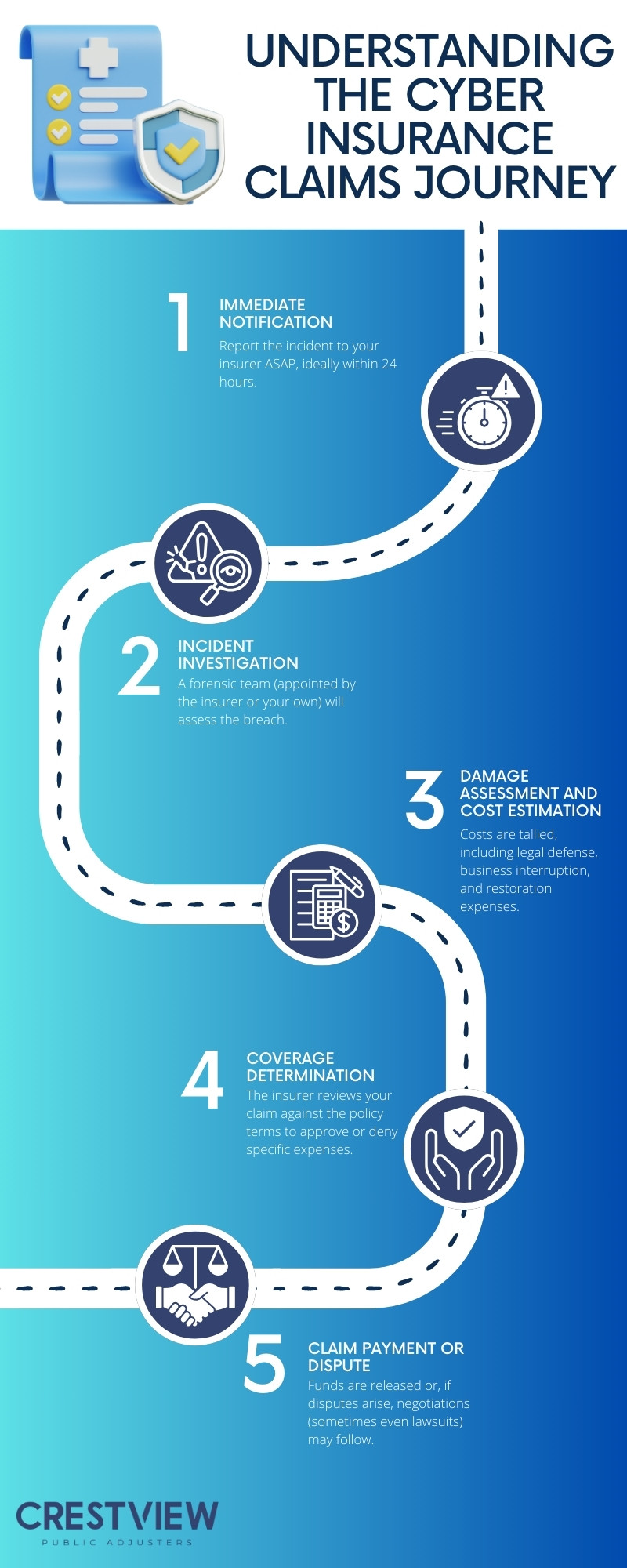Key Points:
- Cyber insurance for MSPs protects against financial losses from cyberattacks, breaches, and service downtime.
- Policyholders need to understand coverage limits, exclusions, and how claims processes work to avoid gaps.
- Working with expert public adjusters can streamline the claims process and maximize recovery.
In 2024, the average cost of a data breach hit $4.45 million, according to IBM’s Cost of a Data Breach Report. For Managed Service Providers (MSPs) and IT providers, the stakes are even higher. With multiple clients relying on their systems, a single breach could mean not just a financial loss—but loss of reputation, regulatory fines, and even litigation. That’s where cyber insurance for MSPs becomes essential, offering a crucial safety net that can mean the difference between recovery and ruin.
What Is Cyber Insurance for MSPs?
Cyber insurance for MSPs protects managed service providers from the financial consequences of cyberattacks, data breaches, ransomware attacks, and third-party lawsuits.
Unlike general business insurance, cyber policies are designed specifically to cover digital threats. For MSPs handling sensitive client data and running critical IT infrastructure, this protection is non-negotiable. Without it, even a minor security incident can trigger a domino effect of expenses that could devastate the business.
Beyond direct losses, cyber insurance for IT providers also covers associated costs like business interruption, notification expenses, crisis communication, legal defense, and fines for regulatory non-compliance.
Why MSPs and IT Providers Need Specialized Cyber Insurance
While all businesses today face cyber risks, MSPs and IT providers are unique targets. They hold access to multiple clients’ systems, making them attractive to hackers looking for maximum impact with minimal effort.
Unlike standard cyber insurance policies aimed at a single business, cyber insurance for MSPs considers the wide-ranging impact of service interruptions or data breaches across multiple clients. Here’s why specialized coverage matters:
- Third-Party Liability: If a client’s system is compromised through your services, you could be liable.
- Data Breach Costs: Notification and remediation for multiple clients multiplies expenses.
- Regulatory Compliance: Handling healthcare (HIPAA), financial (GLBA), or European (GDPR) data adds layers of legal risk.
A basic cyber policy won’t cut it. MSPs need tailored solutions that align with the complexity of their operations.
What Does Cyber Insurance for MSPs Cover?
The scope of cyber insurance for IT providers typically includes several key areas. However, not all policies are created equal. Understanding the scope helps ensure you’re adequately protected.
Core Coverage Areas:
- First-Party Losses: Covers costs incurred directly by the MSP, such as data restoration, forensic investigations, business interruption, and extortion payments (like ransomware).
- Third-Party Claims: Protects against lawsuits from clients alleging that your services caused their losses due to a security failure.
- Regulatory Defense and Penalties: Covers legal fees and fines resulting from investigations by regulatory bodies.
- Crisis Management and PR: Pays for hiring experts to manage public relations and limit brand damage after a breach.
Optional Add-Ons:
Depending on your operations, you might also consider:
- Social engineering and phishing fraud coverage
- Reputational harm protection
- System failure coverage beyond traditional cyber incidents
- Bricking coverage (for hardware rendered useless after an attack)
Each cyber insurance policy for MSPs differs, so a careful review of inclusions and exclusions is crucial before signing.

How Much Cyber Insurance Coverage Do MSPs Really Need?
Determining the right amount of coverage isn’t a one-size-fits-all answer. It depends heavily on factors like client volume, sensitivity of managed data, industry regulations, and average deal sizes.
Calculating the necessary limits for cyber insurance for IT providers requires considering:
- Data Volume and Sensitivity: How much client data do you handle, and what would the cost be if it were compromised?
- Contractual Obligations: Many client contracts specify insurance requirements. Review them carefully.
- Revenue Dependence: Estimate the downtime cost if you’re offline for days or weeks.
- Past Claims and Industry Trends: If your niche has seen rising incidents (e.g., healthcare MSPs), you might need higher limits.
Most MSPs today should consider at least $1 million in cyber coverage, but those handling sensitive financial, health, or government data may need upwards of $5 million or more.
What Should MSPs Look for When Buying Cyber Insurance?
Shopping for cyber insurance for MSPs isn’t about finding the cheapest policy—it’s about finding the right one. Here are the key factors to scrutinize:
Underwriting and Risk Assessment:
- Are your internal security practices being considered?
- Does the insurer understand MSP operations?
Policy Language:
- Are the terms “acts of war” or “nation-state attacks” excluded?
- Does the policy clearly define what triggers coverage?
Coverage Triggers:
- Does coverage apply only when a breach is confirmed, or also during suspected incidents?
Claims Handling:
- How experienced is the insurer in cyber claims?
- Is there a 24/7 claims hotline?
Vendor Panels:
- Does the policy provide access to preferred cybersecurity firms for incident response?
Avoid insurers who lack experience in handling complex IT-related breaches. Choose providers that specialize in cyber insurance for IT providers.
Common Cyber Insurance Exclusions MSPs Must Know
Reading the fine print is tedious—but skipping it can be catastrophic. Many policies exclude crucial areas of risk. Watch out for:
- Known Vulnerabilities:
If you fail to patch known vulnerabilities, you may be denied coverage. - Acts of Terrorism or War:
Cyberattacks linked to political or military entities may be excluded. - Insider Threats:
Some policies won’t cover breaches caused by rogue employees. - Poor Security Hygiene:
Failure to follow basic cybersecurity best practices could void your claim.
Understanding these common exclusions in cyber insurance for MSPs empowers you to either find policies without them—or fortify your defenses accordingly.
How the Claims Process Works for Cyber Insurance
The claims process for cyber insurance for IT providers isn’t as simple as filing a quick form. Expect a rigorous, multi-stage process:

Navigating these steps alone can be overwhelming—especially if the insurer looks for reasons to limit payouts. That’s where hiring experienced public adjusters becomes invaluable.
Why Cyber Insurance Is Not a Substitute for Cybersecurity
Cyber insurance for MSPs offers crucial financial protection, but it should never be seen as a substitute for strong cybersecurity measures. Insurers expect policyholders to follow best practices, and failing to do so can lead to denied claims. Cyber insurance acts as a safety net, but the responsibility of maintaining a secure environment still falls heavily on the MSP. To truly stay protected, it’s important to treat insurance as your financial backup, not your first line of defense.
Maintaining solid security practices is key to ensuring your coverage remains valid. Regularly update and patch your systems to address vulnerabilities, implement multi-factor authentication for an extra layer of protection, and train employees to recognize phishing and social engineering attacks. In addition, always maintain and regularly test your backup systems. By doing so, you can minimize risk, meet insurer requirements, and keep your business resilient against cyber threats.
Protect Your Cyber Insurance Claim with Crestview Public Adjusters
Disaster can make navigating a cyber insurance claim as stressful as the breach itself. Crestview Public Adjusters specializes in handling cyber insurance claims for MSPs and IT providers across New York, Florida, and New Jersey.
We advocate solely for policyholders—not the insurance companies. Our experienced team understands the technical complexities of IT services and ensures your claim is fully documented and aggressively pursued to maximize your recovery.
Don’t let technicalities or fine print leave you underpaid. Contact Crestview Public Adjusters today and put seasoned experts in your corner.

